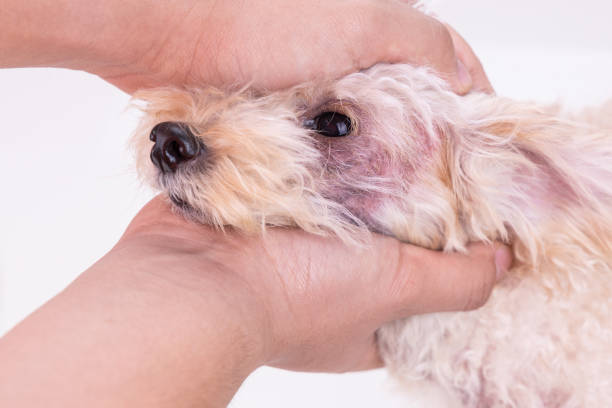Many people are under the impression that if their dog has blood in its stool, it could point to a serious health issue. Nevertheless, such signs can frequently be missed if the pet exhibits symptoms like loose bowels, vomiting, diarrhoea, itching, or fatigue. If you’ve noticed any of these indications and are unsure of what they might mean, consulting with a veterinarian could be the right course of action. Let’s explore the possible causes of this problem and the ways you can help your dog recover.
Many dogs tend to have softer stools, so it may not always cause concern if there aren’t any other symptoms. But of course, if your pup is experiencing something unusual, then you should consult with a veterinarian as soon as possible.
It’s important to know what might cause blood in your dog’s stool because it can be dangerous if left untreated. If you’re dealing with a puppy or senior pet, then the blood may just come from more sensitive digestive issues, but it’s still important to have your pup checked out by a vet.
Blood in your pup’s stool can often be confused with either diarrhoea or vomiting, so make sure that it isn’t because of either. Let’s explore what else it could be because there are several different conditions.
Faecal Incontinence
Faecal incontinence is when your pup accidentally poops or pees (or even vomits) because its muscles are weak. It could be caused by old age, but it can also happen after surgeries, injuries or diseases that affect the nerves, muscles and tissues of the dog’s pelvic area. If you think your pup might have this condition, then it could be because of something like a urinary tract infection or bladder stones.


Rectal Bleeding
Some dogs may bleed from the rectum if they’ve had trauma to their hind end. This can include anything from an accident to having anal glands removed and sometimes even worms in the stool. It’s essential to keep an eye out for your pup because if they are bleeding from their anus, it could result from more severe conditions like tumours or inflammatory bowel disease.


You can also have your dog’s stool examined by a vet to check for red blood cells. If you’ve noticed that there is blood in your dog’s stool, then it’s a good idea to go ahead and have them checked. Blood in the stool could be a sign of something serious, so your pup must see the vet as soon as possible.
Here are some things that you can do in the meantime:
- If your dog is bleeding from its anus or appears sick, then don’t try to treat them on your own. Make sure to take your pup to the vet for an appointment so they can get checked out.
- If you’re dealing with a puppy, then it might be that their stool is just softer than usual because of their age or stage in development.
- Keep an eye on your dog’s stools by checking for blood regularly.
- If there is a more pungent smell to the stool, it might signify something more prominent. In this case, you should try to give your dog some yoghurt or pumpkin to help firm up their stools and make them less loose.


Several conditions can cause your pup’s blood in their stool, so you should have them checked by a vet. It’s important to know what is causing your dog’s blood in their stool because it could be the result of something more serious, like tumours or inflammatory bowel disease.
How to deal with dogs who have blood in their stool?
The best thing to do is call your vet for advice, but here are some things you can try at home. If the stool is primarily solid, there may be bleeding caused by anal glands or because the food isn’t passing through properly (most common in large dogs).
If the stool is runny, there might be bleeding somewhere in your dog’s intestinal tract, which dozens of different things could cause.


How to treat blood in a dog’s stool?
The first step is to do a home treatment of fibre and see if it helps. Find a natural version that is pure fibre and add it to his food when he’s hungry (not right before). If the problem continues after this treatment, it might be more serious, and you should take him to the vet. You can try doing a bland diet for a few days, just white rice and boiled chicken.


When should you take your pup to the vet if they’re bleeding from the anus or rectum?
If the blood is bright or dark red, containing clots, or accompanied by pain or any other symptoms like vomiting, diarrhoea, itching, or lethargy, then it’s time to take your pup to the vet.
It means you should schedule an appointment with your veterinarian if their stool contains anything but brownish-red blood. It’s relatively common for puppies or senior pets to have softer stools than usual to produce some bloody stool. But if there are any other symptoms like vomiting or diarrhoea, it may not be just something benign. A vet visit will help you figure out what might be causing the blood and whether it needs treatment right off the bat or if it can wait.


Can I treat my dog at home first before taking them to a vet for photos and tests?
Your best bet is to take your pup in for preventative vet care, even if they seem perfectly normal after the accident. Keep in mind that the act of removing blood from the carpet may lead to bacteria clumping on the stain, which makes it harder for it to come out.
Even if you clean up the mess quickly, the dog has already left their scent and might defecate again at night or during another time when you won’t notice right away. The only way to be 100% sure there’s no issue with your pet’s digestive system is through tests and photos taken by a veterinarian before making a diagnosis.
Conclusion
If you ever notice blood in your dog’s stool, it is essential to pay attention and figure out the cause. Many different reasons can lead to bloody stools like anal glands or food not passing through properly (most common for large dogs). If there are other symptoms such as vomiting, diarrhoea, itching or lethargy, it might be time to take them to a vet visit.
It is also good practice to keep an eye on your pup’s stools by checking if they have any blood in them regularly so you know when something more significant may be going on with their digestive system. The best thing would be for pet owners who see any signs of bleeding from the anus or rectum should schedule an appointment with a veterinarian immediately. The vet will help you find the root cause of the problem and determine if it is something to be taken care of right away or can wait for a while.


